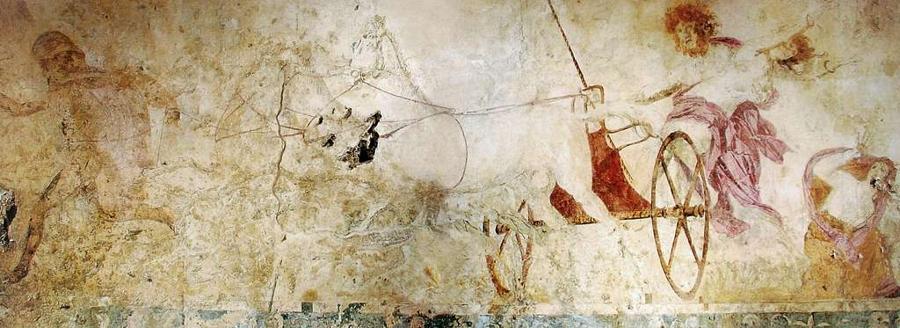
The Legend of Persephone
by Dani Garduño Martinez, age 11
Greek Mythology has inspired many ideas and ways of thinking in our world. Many people looked to and are still inspired by mythological characters to explain experiences in our everyday lives. In this particular story, the Ancient Greeks explained the changing seasons through the story of a goddess being kidnapped by the devil himself.
Persephone is the goddess of spring and vegetation; she also plays the role of the queen of the Underworld. Demeter is the mother of Persephone and goddess of vegetation and grain. Hades is the god and king of the Underworld. Lastly, Helios is the god who sees everything. All of these gods and goddesses play a key role in this story and Greek mythology.
One day while Persephone was picking flowers in the meadows, Hades walked by and instantly fell in love with her. Hades, out of pure instinct, grabbed Persephone, put her on his chariot against her will, and rode away to a place that connected the Underworld and the Earth.
At the same time, Demeter was tending the fields. When her daughter Persephone was kidnapped, she started looking all over the world for her beloved daughter. Since Demeter was a life-giving goddess, her absence unleashed something catastrophic: a global drought. Demeter was not tending to the fields, and without her, crops would not grow. The gods saw this and worried that if they did not intervene, Demeter would not stop looking for Persephone and the people would starve to death, resulting in nobody to worship them. So Zeus, god of lightning, sent Hermes (the messenger) to confront Hades and told him to let Persephone go.
Searching for Persephone, Demeter went to talk to Helios, who told her of her daughter’s fate, but nevertheless, Demeter still continued to search for her divine daughter. Meanwhile in the Underworld, Persephone had not eaten anything in a long while and the pomegranates that were growing there started to appeal to her. Before she was saved by the other gods and left the Underworld, Hades gave her four pomegranate seeds. What Persephone did not realize was that those four seeds she ate meant that she had to return to Hades every half a year. The story then goes that every time Persephone was in the overworld with her mother, the fields would come to life with bountiful and lucious crops. In contrast, every time she had to return to the Underworld, Demeter would cause all the crops to die. This was how the Greeks explained the meaning and origin of the four seasons.
Although we now know the scientific explanation for the changing of season, the story of Persephone has continued to inspire artwork, literature, and even cults. Whether the story has significance today is debated, but it remains as a tale of deception and love.
[Source: worldhistory.org/persephone]



Loading Comments...